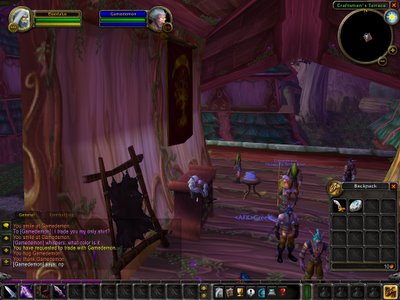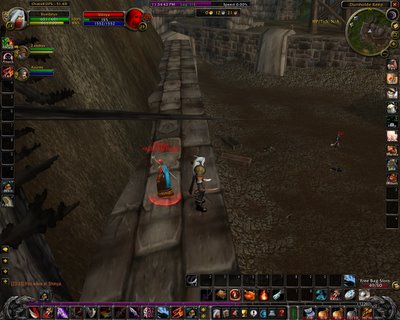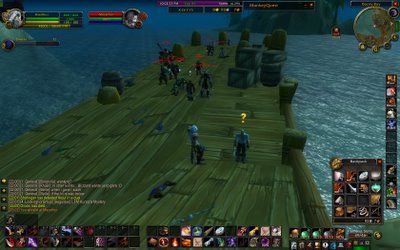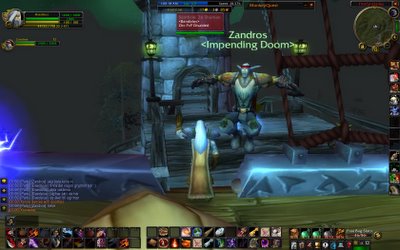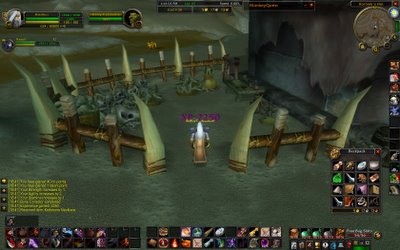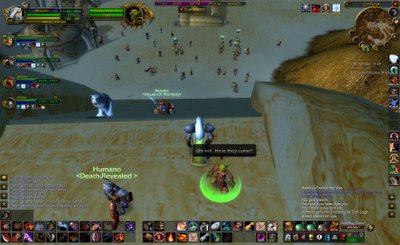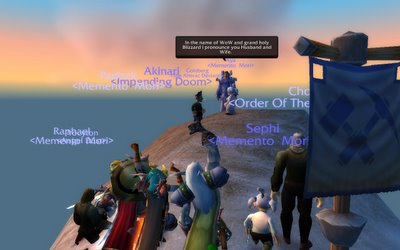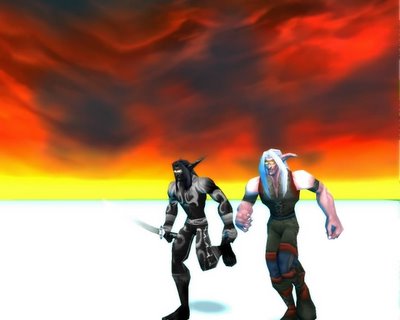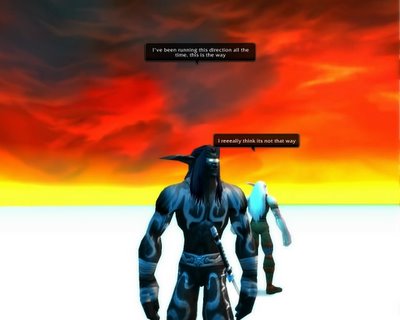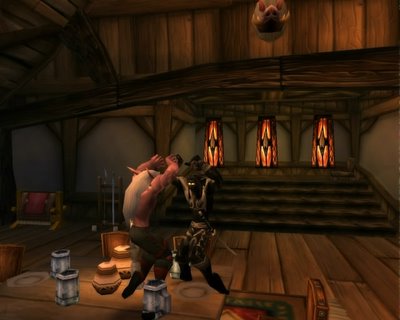Following game designer David Sirlin's extremely widely-disseminated Soapbox on World Of Warcraft's message, posted on Gamasutra last week, a large number of game professional and other respondents took time to write Letters To The Editor commenting on Sirlin's piece, which suggested that the gameplay lessons taught by the MMO are not healthy in terms of setting a real-life example.
We reprint the responses below, showing the wide-ranging set of opinions on Sirlin's bold editorial. Particularly interesting responses or parts of responses have been highlighted in bold.
I feel much the same way about MMOs; after soloing for a little while on EQ, I quit, finding the whole thing not very interesting.
I found the online experience for Battlefield: Vietnam quite different and refreshing: since there's no character advancement, your skills are the defining part of the experience. It's easy to jump in and play solo, or with friends. Unfortunately, I have heard that Battlefield 2 has more persistence (unlockable equipment and/or abilities I think), which seems to me to be going in the wrong direction.
The "Guild > Solo" concept, in my opinion, is required as a partial counter to the "Time > Skill" concept. If a single person could solo 24 hours a day and even come close to being as effective as a group, everyone would do that. Forming a group requires some degree of coordination and skill, and will generally serve as a brake to those with nothing but time on their hands to play the game.
I find it very intriguing that the entire MMO market (with a few small exceptions) has ossified around a single very well-defined paradigm of play, to the point where a game which does not offer that play is doomed to niche status.
Bravo, Amen, and yeah, brother! Gaming systems have always had an implicit moral framework and it's a damn important thing to see what those implicit frameworks are. In fact, I no longer game and this issue is a big part of why. Jeez! I only found out about this article from the Slashdot link.
Mr. Sirlin sounds like he's making some very good points. Not only that, these assumptions are all too common in the world out there; we're surrounded these days with the kindergarden-level mindset that it's not what you accomplish or how good your work is, it's whether or not you tried hard.
"Oops. I erased all your files and threw away the drive but, look, I spent hours and hours writing my apology letter. Doesn't that make up for it?"
"Oh, I spilled red dye on your beige sofa but look at how tired I am from rubbing at the stain with hand soap. Why are you still angry?"
"Well, I know I promised I'd have your research done by today and I know that I spent the money already and I know that you gave me a month to do it but look, I stayed up all night writing; what does it matter that it's on a totally different subject?"
Labor is not equal to accomplishment. Why didn't we move past that when the communist governments fell?
Let me just conclude that I think that Mr. Sirlin makes excellent and perceptive points and that I'll be back soon to see how his terms of service come out.
This is probably the first time in my life that I've written a feedback letter, because this is one of the rare times I've read something so incredibly bias and ignorant it boggles the mind.
- Skill > Time? Because we all know hard work and investing time in a passion could never lead to anywhere even if you have little talent or potential. /sarcasm
- Mentioning that WoW does not reward solo play at high levels when only paragraphs before he says "The only way to become good is to play against others who are good. It takes a village to make a champion. You can't turn your back on the whole world because you NEED the community to improve."
Now, if WoW gives great rewards to solo players, then a large number of people will break away from raiding and do it themselves. Where is the incentive to organize my time and be sociable when I can become the greatest player in the world by soloing everything?
David Sirlin is upset that as an introvert he is marginalized by the game's emphasis on group play. Should it really be a surprise that a massively multiplayer game emphasizes group play over solo? Besides this intrinsic argument, I think it's a fantastic lesson to teach kids anyway. I'm sorry that Mr. Sirlin is an introvert, but it's honestly to his detriment. There is no Being that is not a Being-in-the-World, a Being-with-others. WoW does not marginalize individuality, it does not purport that the aims of the group are superior to the aims of the individual, only that more can be accomplished as a group. It's not really a novel concept that a team of balanced players working together can accomplish a hell of a lot more than a single maverick shaman running around Azeroth.
Also, the time > skill thing is just the game trying to emulate the reality that skill improves with time. It's a principal mechanic of all RPGs. If it wasn't momumentally harder on the servers, I'm sure we'd all like a real-time battle system, in which time-spent would only play a role as far as loot accumulated and actual knowledge and developed skill. However, even then the people who have been around forever would kick your ass.
Really, I don't think that WoW is teaching anything that isn't just a fact of life.
The ToS is seriously retarded though, I agree with the author there.
I loudly second David Sirlin's objection that group play is privileged over solo play in World of Warcraft. I'm less sure about some of his other concerns, but he hit the nail on the head when he wrote, "As an introvert, I'm pretty outraged that this game is marginalizing my entire personality type... playing by yourself in MMO is perfectly valid thing to do."
I play computer games to escape -- to leave the real world and enter one where terrorists do not commit mass murder, leaders don't lie to justify their warmongering, and people don't try to take 25 items through the 8-items-or-less line at the supermarket. I want to enter a fabulous world of fantasy that amazes and delights me. But I'm not, by temperament, a joiner of clubs. I don't want to have to get into some "guild" or "clan" or whatever an MMOG cares to call its particular brand of einsatzgruppen, just to be able to get along. I've observed small-group politics close-up for some time now, and they're never pretty; the only thing uglier is large-group politics. Leave me out.
Some might say, "So what's the big deal? Play single-player games." But as we all know, single-player games can't offer the richness and depth of online games, because their content is fixed. I want to be able to do exactly as Sirlin describes -- to be "alone together." To experience the wondrous variety that World of Warcraft and the other online games have to offer, without being forced to take sides in artificial conflicts that I care nothing about, or be part of what I see as a rather nasty form of tribalism. There's enough tribalism in the real world; I certainly don't want to encounter it in the very medium I'm using to escape from it in the first place!
I want an MMOG for loners -- for explorers and adventurers who want to meet new people in strange lands... and then move on, with no penalty for not being a member of the right social clique.
I will state here at the outset that I have not, to date, played World of Warcraft. Most of the article content however, could be applicable to almost any MMORPG, of which I have played many. A moral case can indeed be made against the current breed of MMORPGs, but certainly not with the points brought up in the article. The points put forward strike me as fundamentally wrong on so many levels.
1 & 2) Investing a lot of time in something is worth more than actual skill.
This is not necessarily, and not often false. 99% perspiration, 1% inspiration so the old cliche goes. Indeed, all skill is a result of time spent on honing that skill. All resources, be it in the real world or otherwise, are also amassed through the investment of time and effort.
In other words, the game is teaching its players what the real world is really like, and equips them with at least one of the skills to succeed in it... perseverance. Yes, natural talent can give you an edge, but hard work needs to be put in nevertheless. This too, applies to Street Fighter.
3 & 4) Group > Solo
This too is true in real life. A group of people, unless completely disorganized, will always be able to accomplish a great deal more than a lone individual regardless of how talented that individual may be. This is the basis upon which we have evolved. Without teamwork and cooperation, we would not have our towering skyscrapers, or modern medicine, or visited the moon, or any number of great things that mankind has accomplished.
True, there is a need for individual expression. And they are there, though often invisible to the powergamer. Roleplaying, the accomplishment of small quests, building a small virtual crafting business... They are all rewarding and challenging in their own ways. However, a lone person should not expect to build the Great Wall of China without help. That's for single player games, which can make you feel as "special" as you want.
Meritocracy is well and good. In an MMORPG however, that also includes the development of excellent social skills and graces. Not all skills are twitch.
5) Guilds
"It's a very weird social environment with the same dangers as nationalism and flag-waving."
I believe the point is to, in fact, promote all this flag-waving. I mean this quite literally. That's why there are guild emblems. In all seriousness though, a monogamous guild system does provide an interesting set of social dynamics. There is a great deal more loyalty and involvement. Like minds congregate. Leadership skills are learned. Politics, if it comes to them, is a whole new game in itself, albeit with high emotional stakes.
Most countries, or indeed even project groups would kill to have the cohesiveness that some of these guilds enjoy. A polygamous guild system would be different. Not necessarily better or worse, but simply different.
6) The Terms of Service
This is one point which I at least partially agree with the author. To use out-of-gameworld rules and punishment to control in-game behavior both breaks immersion, and creates a sense of uncertainty and insecurity for the player. (Will I be banned if I do this thing that's in the "grey" area?) It ultimately serves to expose the shortcomings of the game system.
However, in the absence of an adequate game system, external rules may indeed at times be more beneficial than no rules at all. If the rules improve the gaming experience and immersiveness for a majority of the players, they would serve as a good temporary measure. A "society" that has descended into total anarchy is typically not something the typical MMORPG player would want to get involved in. For a Counterstrike or Starcraft player though, it would be a whole different story.
To sum up, the author has a set of personal ideals, probably calculated by playing many traditional single player games. However, an MMORPG is a much more complex creature. The attraction is most often in the social interaction. Game mechanics, no matter how polished, become stale in due time. It's the people that make it an interesting and fulfilling experience.
I really appreciated the editorial on World of Warcraft. It echoed many of my own thoughts. While I do play the game and enjoy it, I do so with my brain turned off, not expecting it to be anything more than what it is -- the best out of many mediocre options.
I, too, am the type of player who enjoys being alone in a crowd. I'm in a guild only out of necessity. (We have, by the way, found an okay work-around for the single-guild us-vs-them problem -- We allied with other guilds and keep an inter-guild channel.)
A couple of thoughts...
Not to defend Warcraft, but this editorial seemed to take the point of view that all games (or perhaps the best games) should be winnable by merit or skill, forgetting that there are other, equally valid games winnable by other methods. Some are winnable by luck. Blizzard chose for WoW to be winnable by "investment of time". Maybe they chose that for financial reasons or simply to appease the lowest common denominator of player. It's not a decision I agree with, but it's still a valid choice. I would prefer winning by merit, myself. Rank 14 would be a lot more impressive to me if I knew it was earned by skill alone. Right now, I see it as a label that just says "sad".
My second point... in my opinion, this editorial missed some of the worst things that the game teaches. Apart from the notion that "I've put in time and therefore I'm entitled", there are a few other lessons that are just as bad.
1. Mental laziness. There's no critical thinking in this game. You "win" pretty much just by showing up.
2. The only solution to any problem is to kill your opposition. There are no choices to be made, no opportunities for any other types of solutions (such as is possible in games like Neverwinter Nights).
3. On PvP servers, it fosters and encourages bullying and the worst sort of predatory group behavior. Many players perceive that way to "win" on a PvP server is by railroading your opponent with overwhelming numbers or levels.
4. The game is actually unplayable on a PvP server if one high-level player decides to set up camp in your area in order to kill you, your friends, quest givers, vendors, innkeepers, and everything else. It's like trying to play a game of Monopoly if one player is dealt all the property cards and hotels at the beginning of the game. This is actually not considered game-breaking behavior or "griefing" and is considered by the GMs to be a valid way of playing the game.
Someday, someone will make an MMORPG that addresses these issues, that doesn't treat the players as though they're over-privileged brats who feel entitled to everything, who are idiots that need to have everything spoonfed to them. There are a few promising games on the horizon. I'm watching and waiting.
After reading the Soapbox article by David Sirlin I have to say that I was dumbfounded and even a bit outraged. I've been playing WoW for over a year. I have a great appreciation for the game and think that the programmers and game designers have done a wonderful job. Some of the things I would like to respond to are below:
"Grand Theft Auto appears to be about shooting cops and hookers, but it's actually a game of exploration and freedom."
Ummm...hello...have you played the game? It's about exploration of your hookers and freedom to kill with your gun. Most games are basically an escapism of some sort. I'd rather have my child using a fantasy realm then the gritty streets of the city.
"1. Investing a lot of time in something is worth more than actual skill."
Doesn't investing time increase your skill? If you are a level 2 can you beat a level 5? Probably not. Even as a level 60, the more time I put in the more efficiently I learn to use my skills and char.
"Once you get up to rank 10, you are now competing against people who play the game 10 hours per day and up. There is no limit to how much a person can play, so players are driven to play every waking moment (forget having a job or social life) for fear that if they don't, some OTHER player will do so and be ahead in rank."
Who says you have to PvP? Where is that written? If your drive and desire make you want to achieve #1 status then you will put in the time and energy required. I PvP from time to time, but I do PvE instances far more. Even a 5-man instance can get you Tier 0 epic gear.
"3. Group > Solo. You can forget self-reliance, because you won't get far in World of Warcraft without a big guild...
Some personality types want to do things with 39 other people, but my personality type certainly doesn't...
Unfortunately, the game offers no difficult solo content leading to good loot."
Normally you don't need to start grouping until around level 25+, then the instances are few (Wailing Caverns, the Stockades, and Deadmines). As you get to 35+ the need to group becomes a bit more defined. If you want "phat loot", you can PvP instead of instancing... oh wait... his previous point was that "honor" and PvP are bad. Isn't this an MMORPG? A Massively Multiplayer Online Role-Playing Game is most definately NOT the same a Street Fighter tourney.
"Many of the players are brainwashed by this poor assumption, often saying "It's an MMO, of course you have to group with 40 other people do accomplish anything...
40 mundane people with a lot of time would put Albert Einstein to shame any day of the week in this game."
Oh...he figured out a way to try to avoid the basic principles of what and for whom an MMORPG is designed. And "40 mundane people"? Evidentally he's never hit any of the higher level instance because "40 mundane people" could not clear MC, ZG, Onyxia, Kazzak, Azuregos, etc. It takes 40 people who know their class, who can play their char and who have worked to achieve the good gear to get that far. It also requires massive teamwork and good leadership.
"I'm fairly prominent with Street Fighter players, and have a lot of influence in how national tournaments are run. I'm known by about 0.01% of Magic: the Gathering players, but I do put my toe into their pond a fair amount. Meanwhile, in Warcraft, I live in a world of "guild-only events." You're either with a guild, or you're nobody to them. I can't imagine being in only one IRC (chat) channel at a time, or choosing only one gaming community, yet I can only join one guild at a time. It's a very weird social environment with the same dangers as nationalism and flag-waving."
What I get from that first part was..."I am used to being a big fish in an little pond and hate being a little fish in a big pond." I wasn't in the guild I originally ran MC with. I wasn't in guilds that were entirely exclusive. And a guild fit is like a glove... either it fits you or it doesn't. If it doesn't try on the next glove, eventually you will find one that fits your social style, your gaming style, and your personal preferences. And as an American military veteran, I find nothing wrong with pride... be it my own nationalism and flag waving... or the pride I feel in my guildmates when we accomplish wonderful things together.
"6) The Terms of Service."
Ummmm...rules are a bad idea? Then he goes on and on about Kazzak. Has he ever seen Kazzak? Does he realize how easy it is to die at Kazzak? Especially for "40 mundane people". Let me remember the rules for Street Fighter... I don't believe there had to be any. Magic has rules on how to play, and again it's not designed to be a "group effort" but they dang sure don't want you to palm cards to try to win... it's you with your cards doing the best you can against someone who may have spent $2,000 to get the "Power 9". When you have a game that has to play with as many people that WoW does, work with as many areas that WoW does, and have as many different instances running at the same time WoW does it needs clear cut rules.
"This problem is so troubling, that I feel a personal need to take action. The only thing I can think to do, though, is to design an MMO that teaches the right things. Look for that on store shelves in 2012 or so."
I think that an MMO designed with no good rewards, with no cooperation, with no social interaction, with everything achieveable in 10 minutes, with no rules would sell as well as Gigli did.
I am not the "average" gamer. I am a woman. I am a mother... in fact, a grandmother. I have a full time job and support my entire household. WoW has created an environment that I enjoy... that I think others enjoy as well since it is the best selling MMORPG. So WoW programmers, game designers, artists, tester and GMs...Thank you!
I disagree with several of the author's points.
"1. Investing a lot of time in something is worth more than the actual skill."
To say spending time to achieve something in an MMO has no connection to the real world is ludicrous. Whatever happened to teaching kids to work hard for something? OK, so skill > time, but how do you develop skill? By doing something a lot, and that takes time. Do you think the user interface artist you have at work woke up one morning and just became great at it? No, I'm quite sure boatloads of time were invested to get there.
Even if you're not honing a skill to perfection, some things in life just consume time to get them. Your teenager wants a car? Well, get a job at McDonald's and start saving... it's going to take lots of time to get it. When they finally earn enough money, that car will be well deserved. We're a society so grounded in instant gratification that's its really quite sad. Would you rather teach your children to work hard for something they want, or heck, just put it on your Visa so you can have it right now and you can pay it off later?
Hearing someone complain about how they have to spend time to achieve something in WoW is extremely comical. Obviously you've never played games like Everquest. The time investment to achieve the top ranks of a tradeskill or class in WoW is measured in months, if not weeks or days. In EverQuest, many of them are measured in years. I played EverQuest for five years and I can count on one hand the number of people I knew personally that had maxed out the tailoring tradeskill. In WoW, you can do it in an evening if you've got the money. 95% of WoW is so bloody easy, that when people get to that last 5% that requires some actual effort, they start to scream. If all of the game was as easy as the first 50 levels, most of us would have consumed all of the content and long since cancelled our accounts. What would be left to do?
"6) The Terms of Service"
Again, I completely disagree about what this teaches our youth. To agree with you would essentially be telling them that "If you can get away with it, it must be ok!" Any member of civilized society has to deal with things called laws that are often arbitrary, yet it's still illegal to break them. That nice four-lane divided highway cutting through the middle of my town has a speed limit of 45 mph, why? It could (and should, in my opinion) be 55 mph. It's a completely arbitrary rule that I have to comply with. Just because I CAN drive well over 45 mph does not make it okay.
Your example of player-created casinos is a perfect correlation back to real life. Gambling is illegal in lots of places and situations in real life, but it's quite easy to do. It's another arbitrary rule that we have to deal with. How on earth you can say a rule against it in WoW "goes against everything I've learned" is beyond me. You've got to remember an MMO is a society of its own, complete with it's own economy, social structures and rules. It's not a closed environment like Street Fighter, where nothing you do can affect anyone outside of your current match.
The coding behind these games is immense. To fall back on the excuse that 'well, if the developers didn't intend for me to do this, then they shouldn't let me do it' or 'it's a bug, and it's not my problem if they haven't fixed it yet' is a just lazy way of appeasing your conscience. No code is perfect, look at the rate at which hackers find holes in our operating systems, Internet browsers and so on. It’s simply naïve to expect every possible scenario and situation to be addressed by a piece of software as complex as WoW. You know if you're doing something you shouldn't be doing. Use the opportunity to teach your kids a few lessons about listening to their own conscience. I'd find that a far more valuable lesson.

There is so much ridiculous and wrong with this essay, I don’t know where to start. So, instead of trying to address it all, I’ll focus on one specific part that fairly represents the whole.
“4. Group > Solo. I'm not done with this yet. As an introvert, I'm pretty outraged that this game is marginalizing my entire personality type.”
Let’s try this same logic on for size with some other games:
“As a law-abiding gamer who is sickened by the idea of even simulating killing hookers, I’m pretty outraged that GTA is marginalizing my entire personality type.”
“As an extreme introvert, I’m pretty outraged that every online-only game forces me to see other people running around (and allows them to see me), thereby marginalizing my entire personality type.”
“As an avid lover of platformers, I’m pretty outraged that Splinter Cell has so little jumping around on floating rocks and landing on turtles, thereby marginalizing my entire personality type.”
“As a chess fan with poor hand-eye coordination and immensely deep thought processes, I’m pretty outraged by every first-person shooter, fighting game, and platformer for marginalizing my entire personality type.”
Have I made my point? The logic used in the rest of this essay is about on par.
I felt the need to write a rebuttal after reading David Sirlin’s Feature article “Soapbox: World of Warcraft Teaches the Wrong Things.”
He mentions in his first point that "Investing a lot of time in something is worth more than actual skill." That "This is an absurd lesson that has no connection to anything I do in the real world." Well I disagree. I could have five times the talent of any of the game designers or directors that he has on his staff but if I haven't put in the hours at other gaming companies, if I haven't "grinded" my way through this fully functional game sample or fought my way up the corporate ladder, I'm not going to get the job.
Perhaps time invested shouldn't count in a fair game. But if you take two people who are relatively the same in all aspects (fair) and one spends an hour learning martial arts while the other takes 10 years, and the two are then put into a 'fair fight' - who will most likely win? Hours equal learning skills. Just knowing that slamming your hand against a brick will break it - you need to practice, practice, practice until you get that skill honed.
Onto the next point. Mr. Sirlin seems to be all about the "fair game" and how WoW doesn't teach this behavior - having level 60s that tower with unfair advantages over lower level characters. Again, something that isn't applicable in his 'real world'. Once again, I ask what real world that is. Even in the gaming industry, there are multiple examples where larger corporations (longer grind, greater level) often put pressure on smaller indy development companies or, even better, buy them outright, taking their products, designs and customer base and then firing the staff. In an ideal world - sure, fairness would be great - but this isn't the real world.
Now let's go onto Solo vs. Group. Soloists should be given as much rewards as anyone who works on larger projects in groups. Really? A Tale In the Desert is an MMO that many developers of MMOs have praised. It is unique, creative, immersive and quite the challenge MMO. And yet, because it is only produced by a small handful of people it isn't getting nearly the 'rewards' it should. Granted, it is a small group and not just one person, but for the purpose of comparison of their "company" to that of other MMOs out there - they can be considered solo. Same with EVE Online and perhaps a plethora of others.
In addition, how far would David Sirlin be right now if he was doing all of his work "solo"? Does he know how to program as well as his engineers? How about create artwork as his artists? Let's include marketing, shipping, copyright law and accounting in this. Would he be at the level of success he is if he never 'grouped' with anyone?
And the 'guilds' that are/is the computer gaming industry is just as powerful and painful as an MMO guild. There is no "Us vs Them" in the real world? That is the basis of almost all business in America - including the gaming industry. To make the next best MMO, one that will put all others to shame. That isn't an "Us vs Them" scenario?
Someone could try to look at it as simply a challenge for “Us” to do the best we can do, but I know of no company that will invest time and money into any project that won't exceed and beat the current industry leaders. I know of many MMOs have folded because they didn't have the expectations that people wanted, they didn't have the player base they hoped for and had to close shop. And these expectations are based on what "Them" are doing.
As for just the guild/thug mentality - it happens all the time. Granted, perhaps my own opinion about myself might be biased, but I have directed two MMOs, helped to produce over a dozen PC stand-alone games and have done much related work in the creation of fantasy worlds and entertainment. But will anyone even dignify me with an interview? Nope. Why? Well there could be any number of reasons given but in more than a couple instances, I know that such things as age (over 30? he's washed up - a lovely article about it in a past issue of Game Developer magazine), lack of experience (again, time=rewards) and a number of other factors play into the guild of the gaming company keeping down the 'noob'. Sure, this can be seen as little more than making excuses as to a lack of my employment attempts. But isn’t that what people do when they lose a fight that was unfair?
Finally, Mr. Sirlin states using the Terms of Service as enforcement against certain player actions is against everything he's learned. Unfortunately, it isn't against what I have learned. I have learned that when a player discovers a loophole, either he, or someone he informs about it, will exploit it to a level where they then gain the 'unfair' advantage that David seems all about. Everything has rules and people who do not abide by them should suffer consequences for said actions. We live in a country besieged by laws that protect those who don't have the common sense to keep themselves safe. If you cannot walk into an unlocked house and steal everything there, why should you be allowed to 'steal' in a game because a bug has kept the game's door unlocked?
Oh, and even if a court finds that there is nothing illegal about selling game items and money for real world money, as a company an MMO can decide to refuse service to anyone for whatever reason they want to – which is a legally guaranteed right for a business such as those that produce MMOs.
Yes, Blizzard and most other MMOs treat their customers “like babies”. But if the customer base didn't act like babies - taking unfair advantage of the system's limitations or bugs or of lesser skilled players, then they wouldn't have to.
In the end, I find Mr. Sirlin views to be ones through rose-colored glasses. The real world isn't about fair fights, helping the lone person along and touting him for his abilities regardless of the work he put into getting them. It is about the powerful getting ahead and others learning how to be just as powerful. A perfect example is that this response to David Sirlin's Soapbox feature will, at best, just be published as a "Letter to the Editor" because I am not a level 60 Game Developer in this industry's guild.
David Sirlin's rant against the life lessons imposed on World of Warcraft players by Blizzard is thoughtful, passionate, and entertaining. But his attempt to separate innate skill from that acquired over time is specious because in most real-world contexts (a standard he cites in support of his argument), the two are in the overwhelming number of instances either hard or impossible to separate. Yes, there are prodigies in music, mathematics, programming, chess, and no doubt other forms of gaming, but they are virtually unknown in most other human endeavors, such as painting, writing, parenting, dancing, playing baseball--indeed, most physical skills.
Take painting, which I would argue is typical in this regard. Even the most famous painters--the Rembrandts, Monets, and Van Goghs--all had to go through a learning stage--typically of many years duration--during which they acquired increasing command of their medium and the set of physical skills required to manipulate it. To take a famous case, Van Gogh was not born "Van Gogh". He made himself into Van Gogh by years of painting. Much of his early work looks nothing like that of the Van Gogh we know and love. Most of his earliest works are worthless as paintings except that they were executed by the Van Gogh who only later became skilled enough to become world-famous.
Similarly, painters of indifferent ability (or "talent," if you prefer) can acquire professional-level skills almost solely through persistance, by simply painting through all the disappointments and frustrations, by feeling so passionate about what they are doing that they keep at it regardless. The vast majority of working professional painters would agree with this assertion. Will they ever become Van Goghs? Probably not, but we and they will never know unless they stick with it.
I completely agree with Sirlin that an individual who possesses prodigious skill should not be penalized for not having to take so long in achieving mastery. But a game, say World of Warcraft, that rewards passion and persistance is perhaps truer to real life, and therefore provides more useful lessons, than he would like to admit.
David Sirlin's Soapbox piece was an entertaining read, but he missed what could be the most important (for him) of WoW's teachings:
There is more to life (and games) than winning.
I could make the easy joke and point to Street Fighter as the culprit for damaging this young man's brain to the point where he can't learn, can't /see/ such a simple lesson. But I won't. Because I believe that it's not the games that bring these teaching qualities to the table: the player does that himself. Games simply act as a mirror, where you see only what you are looking for (so if you're Jack Thompson, you see filth and depravity). As a gamer, you will be interested in how well a game supports your particular interests, and be mostly oblivious to any other qualities the game may possess.
In that sense, the Soapbox is little more than "I love NBA, therefore Baseball games are boring." Still, an entertaining read. His point about how the rank system promotes, even requires, players to engage in unhealthy and addictive behavior patterns is quite real, as several former top-rank players have described elsewhere. On the other hand, I don't think he really understood much of what Raph Koster wrote in his book, as I found his application of Raph's definitions fairly off the mark.
I find the article "Soapbox: World of Warcraft Teaches the Wrong Things" really interesting because it tackles one of the key aspect of games in general.
Koster's book is really brilliant even if the word "game" would have probably been more suited. Game teaches indeed, and the author of the article managed to develop that statement succesfully.
Howewer, I beg to differ when it comes to the subject of World of Warcraft. The game has many, many flaws but it managed to teach a few good lessons. Although it's a different kind of lesson than the one we've learned while playing offline video games.
Reading the article i have the feeling that WoW only teaches bad lessons. I was particularly bugged by the statement "Group > Solo" as if it were a crime. This is missing a big point of the main gameplay of WoW and most of the online persistent games. The whole point of online games is to play in a team, that's what makes the genre shine. That's what make most players disregard the countless flaws those games still have today.
The main goal of Wow is to get you to play in group. The biggest effort design wise, as gameplay is concerned, is put on group play. Obviously when you pick an online game you do because it will give you the opportunity to experience complex group gameplay.
You cannot expect Blizzard to put most of his effort on solo gaming while heavily marketing an online game. On the other hand you can expect them to say they "cater to solo players", to give the impression that no one will be left out.
Now each game sets its own challenge, the biggest challenges in WoW are designed with group play in mind thus it is only natural that the group receives the better rewards.
As game designers, Blizzard must make choices, choices limited by resources, technical and economical. They made the choice to cater first to the players that want to play as teams. They probably pushed it too far by making teams of 40 players a requirement for certain parts of the game. But the online games are still in their infancy design wise. Therefore they are filled with bad decision choices. WoW is not exception. Online games make up for it by being able to evolve though WoW isn't a finished product, it's a work in progress. Designers are still working on it, scratching their heads and having to make delicate choices as they go along.
While i played WoW from level 1 to level 60 the good was good enough for me to forgive the bad. At 60 the bad became overwhelming and I left. What lesson did I learn?
I think I learned that on a game of this scale you're not facing a single teacher but the whole school. In a typical school you'll meet inspirational teachers and vicious bullies. But, when graduation day comes you should be able to tell if the things you learned were worth getting beating up.
My point is, you're focusing on "details" of WoW. The honor system for example is merely a window of a huge skyscraper. It is there if you want to participate in it, it is in no way required.
And more importantly it will not handicap you as you experience the best parts of the game. A diploma is just a sheet of paper, it's all the thing you went through to get it that matters.
I read David Sirlin’s article, Soapbox: World of Warcraft Teaches the Wrong Things, and felt the need to voice my disagreement with respect to his comments regarding the Terms of Service for World of Warcraft.
First, a bit of my background. I have been playing World of Warcraft since it launched in November 2005, and have been avidly playing MMOs since December 1999, when I started with Asheron’s Call. Prior to the past eight months or so, I worked long hours as a lawyer at a big law firm, so my experience playing MMOs was either solo play (“being alone together,” as Mr. Sirlin put it) or playing with a group of four or five friends – no “big guild” stuff. Recently, however, I have joined a big guild in World of Warcraft and for the past three weeks or so, have been raiding Molten Core with a 40-person team. My experience with MMOs has been as a player, not as a designer or programmer.
Now, my bias as a player. For the most part, I have been that MMO “introvert” described by Sirlin in his article. Until recently, I simply never had the time to pour into raid content. I would look at the players with the great weapons and armor and know that I would never be laying my greedy hands on anything like that. Essentially, I was denied a large part of the content of games such as World of Warcraft because of a demanding job. So I basically agree with Mr. Sirlin’s condemnation of rewarding time over skill, and grouping over solo play.
That being said, I do not agree with his bashing of World of Warcraft’s Terms of Service. Mr. Sirlin believes that player behavior should never be limited by the ToS, but rather, the developers must program to prohibit unwanted behavior. To me, this is Street Fighter thinking applied to an MMO, and it doesn’t work. There is too much freedom of behavior in MMOs to close all loopholes through coding. Or rather, there is no way to economically close those loopholes. Sure, Blizzard could spend ungodly hours and programming resources to prevent myriad forms of unwanted behavior, but most of this unwanted behavior happens infrequently, so the “bang for the buck” in using coding as a solution would be small.
A good example of this is World of Warcraft’s profanity filter. I’ve heard a lot of people defend their right to curse like a truck driver in open chat due to the fact that other players can enable the profanity filter. Does anyone really think the profanity filter is effective? I know I can circumvent it pretty easily by making minor spelling changes to “bad” words. Build a better mousetrap, and they’ll build a better mouse. So what’s a better solution – dedicating resources to constantly refining the profanity filter, or letting people complain to Blizzard game masters in the infrequent situation where someone gets out of hand? And incidentally, “freedom of speech” (another common justification for rampant profanity) is a red herring in this environment – the First Amendment imposes limitations on the government, not private parties like Blizzard.
Further complicating the issue programming away the loopholes is that the freedom of MMO behavior creates gigantic “gray areas” where behavior might or might not be acceptable. For example, World of Warcraft has quests where a player must kill X number of mob Y. What if a level 60 player (“Leetman”) ran around in the quest area and slaughtered every one of mob Y, preventing a level 10 player (“Noobzor”) from completing the quest? Is Leetman doing something wrong? What if Leetman is grouped up with a friend who is level 10 and actually doing the quest? What if Leetman is farming mob Y for a component needed in crafting? What if Leetman is simply doing it to annoy Noobzor? Now, how do you program to prevent Leetman from harassing Noobzor while allowing Leetman to engage in legitimate activity?
Mr. Sirlin erroneously seems to think that because World of Warcraft is a computer game, solutions to the game’s problems should be through coding. I disagree because many problems in World of Warcraft aren’t game problems, they are people problems. And people problems aren’t easily solved through coding. I analogize MMOs to restaurants. They are both businesses that are privately-owned but open to the public, where customers gather together in a common environment and pay for service. You know those signs that all restaurants have? The ones that say they can refuse service to anyone? That’s their Terms of Service. Like restaurants, MMOs make money when they have lots of customers. If there are a few people disrupting other customers, those few people will be thrown out to ensure the other customers remain customers.
One of the differences between restaurants and MMOs is that restaurants have been around a long time, resulting in generally accepted rules of behavior. MMOs have only been around for a few years, and consequently do not have generally accepted standards of behavior, especially considering that the MMO environment offers freedom of activity far greater than that in a restaurant. MMO Terms of Service therefore attempt to toe a fine line between reserving the right to “refuse service to anyone” and giving their customers fair notice as to what will get them kicked out.
In closing, I simply think that Mr. Sirlin’s view towards World of Warcraft’s Terms of Service is myopic. He wants the freedom to do anything in-game that the program code allows. Not only do I think it would be virtually impossible to program away all potential “loophole” behavior, but even if it were possible, it strikes me as a colossal waste of time to do so. The Terms of Service is Blizzard’s time saver. And as our goblin friends are fond of telling us, “Time is money, friend.”

Gamasutra - Soapbox Responses:
World of Warcraft Teaches the Wrong Things
Page 1 - Page 2
